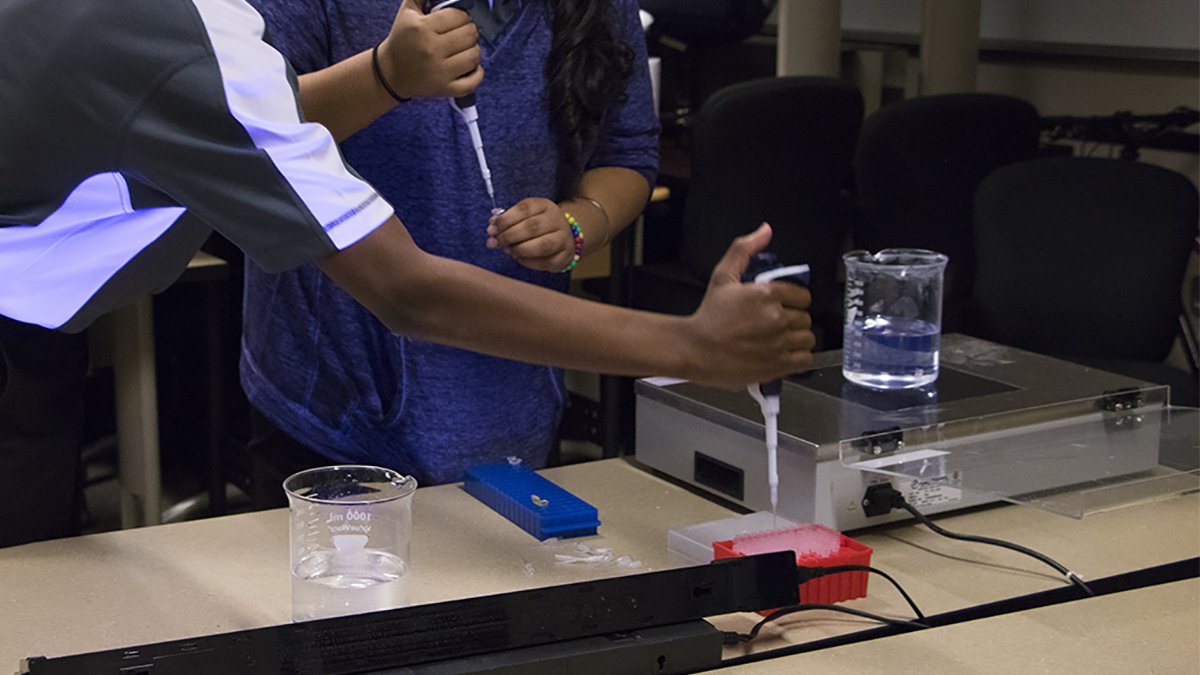KUEC STEM Summer Camps Turn Learning Into Fun

Love math? Science? How about fun?
Kansas City-area middle schoolers who say “yes” to all three questions might want to check out the 2018 Summer STEM Camps during the month of June at the KU Edwards Campus.
The camps are each four days long and range in topics from robotics to biotech to chemistry and more. Specific sessions cater toward girls who want to learn computer coding, and kids who enjoy using math to solve problems and puzzles.
“From a kid's standpoint, the camps are fun, they're engaging – they're like doing puzzles in the middle of the summer,” Katrina Rothrock, a UKanTeach Master Teacher for KU’s Center for STEM Learning, which oversees these camps. "From a parent's standpoint, these camps are enriching and will connect with what students are doing in school during the school year."
The camps are aimed at students entering sixth through ninth grades for the Fall 2018 school year.
"We're providing an opportunity for kids to find STEM fun right at the age students start dropping out of STEM classes,” Rothrock said. “It's a prime time for them to decide whether they're going to remain interested in STEM."
Girls in particular tend to drop out of STEM classes during this age, she said, which is why one of the camps – Girls.code – is focused entirely on teaching young women how to get started in computer science. That camp is offered from 8 a.m. to noon, June 25-29.
Young students won’t be the only ones learning at this summer’s camps: Some sessions will also be open to teachers from the area, Rothrock said, so they can take the lessons back to their own classrooms and make early-level STEM classes more fun.
Rothrock said the camp instructors – members of the KU Edwards Campus faculty, professionals in STEM fields, or both – are required to help students do three things during their time at the camps.
“First, the camp has to be fun,” she said. “Second, It has to feel like the kids are playing, but it has to be instructional. By the time they leave camp, the kids need to know quite a bit more than they did."
And third, she said: It has to be hands-on. "The kids are making something, they are doing something every day where they are personally involved in creation or thinking about the challenge of the day."
One other benefit, Rothrock said: A chance for kids to make new friends. "We have kids who come from all over Kansas City,” she said. “We've had kids from all over the world, in fact. In all our camps, the kids collaborate with each other. We encourage them to experience failure so they can talk about it, but also to be successful so they can feel like they've mastered the week.”
Camp tuition ranges from $90 to $175.
Individuals with disabilities are encouraged to attend University of Kansas sponsored events. If you require a reasonable accommodation in order to participate in this event, please contact Katrina Rothrock two weeks prior to the event at rothrock@ku.edu or 913-897-8441.
How to STEM at Home
Encouraging kids to study math and science isn’t just the job of teachers. Rothrock says parents also play a role:
At home, parents can support their students’ learning by asking questions. Good questions. Questions that require kids to describe what they’ve experienced, observed and concluded. Questions that require more than a yes or no answer. Questions that probe a little more deeply and ask kids to expand their thinking beyond immediate experience and wonder why something works the way it does. Questions that make the child want to go explore and learn more.
And parents can support STEM learning by providing opportunities to engage in inquiry at home, without the risk of being told they’re wrong, and without the risk of the parents handing over the answers. Kids need space to wonder, and then to search out their own answers. If someone else is always providing the answers, it reinforces for the kids that not only do they not need to find the answers, but that they probably aren’t as capable as the people providing the answers.
Check out KU Edwards Campus' academic programs in STEM: from biotechnology, exercise science, molecular biosciences, applied statistics and analytics, and accounting.





